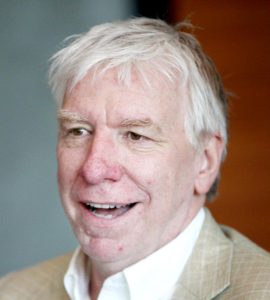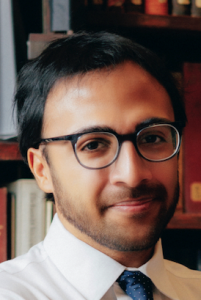EP 695 Influencers Becoming More Influential than Journalists for Young People
 The Reuters Institute has published a study indicating that TikTok influencers and celebrities are increasingly taking over from journalists as the main source of news for young people. What started out as a hobby for many in the 2010’s when the recession hit many job sectors hard has become a a dollar soaked industry for some who can use their authentic voice to attract followers awaiting their next post, picture or video to tell them how to dress, shop, interact or think. While most people in this industry do not make the big bucks, just as in the podcasting world, a few have become cash cows for marketers who give them product to promote or lavish substantial endorsement deals on them. The cost of entry to attempt to make your mark is low and can lead some influencers to enjoy success on stage, film and in high-end ad campaigns. Our guest, Emily Hund, has written “The Influencer Industry: The Quest for Authenticity on Social Media.” We explore this growing sector and its impact on us as individuals and our society.
The Reuters Institute has published a study indicating that TikTok influencers and celebrities are increasingly taking over from journalists as the main source of news for young people. What started out as a hobby for many in the 2010’s when the recession hit many job sectors hard has become a a dollar soaked industry for some who can use their authentic voice to attract followers awaiting their next post, picture or video to tell them how to dress, shop, interact or think. While most people in this industry do not make the big bucks, just as in the podcasting world, a few have become cash cows for marketers who give them product to promote or lavish substantial endorsement deals on them. The cost of entry to attempt to make your mark is low and can lead some influencers to enjoy success on stage, film and in high-end ad campaigns. Our guest, Emily Hund, has written “The Influencer Industry: The Quest for Authenticity on Social Media.” We explore this growing sector and its impact on us as individuals and our society.
Podcast: Play in new window | Download
 The future of car design is no longer in the hands of car companies as technology has become the biggest driver behind new car models. Major trends in cars clearly point to a future when the buzzwords will be electric, somewhat autonomous, connected, safe and sleek. And they may look nothing like they do today. The evolution of the car from an emblem of freedom and open skies to a more practical application, according to research, began in the mid 90’s. The dream of a sports car was eclipsed by what was considered a safe, utilitarian SUV, though, in truth, bigger does not mean safer. Our guest, Jack Hitt, while writing on a range of subjects for many publications, has contributed to the thinking about the future of the automobile with pieces in the New York Times Magazine and other publications. In this conversation, he answers questions about all kinds of developments in cars–those that fly, drive themselves and are powered by electricity. He even lets us in on what might be happening with the most talked about, but never revealed, secret in the car industry. Is Apple going to disrupt the marketplace as it did with music and phones? Find out today on this podcast.
The future of car design is no longer in the hands of car companies as technology has become the biggest driver behind new car models. Major trends in cars clearly point to a future when the buzzwords will be electric, somewhat autonomous, connected, safe and sleek. And they may look nothing like they do today. The evolution of the car from an emblem of freedom and open skies to a more practical application, according to research, began in the mid 90’s. The dream of a sports car was eclipsed by what was considered a safe, utilitarian SUV, though, in truth, bigger does not mean safer. Our guest, Jack Hitt, while writing on a range of subjects for many publications, has contributed to the thinking about the future of the automobile with pieces in the New York Times Magazine and other publications. In this conversation, he answers questions about all kinds of developments in cars–those that fly, drive themselves and are powered by electricity. He even lets us in on what might be happening with the most talked about, but never revealed, secret in the car industry. Is Apple going to disrupt the marketplace as it did with music and phones? Find out today on this podcast. Over 40,000 Americans die each year due to gun violence. And while a person pulls the trigger, there is no doubt that the weapon, guns of all sort, make the effect and lethality of violent exchanges so much more costly. That’s one of the many myths that Dr. Thomas Gabor and Fred Guttenberg dispel in their book “American Carnage: Shattering the Myths That Fuel Gun Violence.” It is an evidence-based attack on old bromides, legends and half truths put forward by the gun industry to convince you, for example, that ‘an armed society is a polite society.’ If that were the case, America would not have meted out such cruel punishment to so many families as we commit a third of all the gun-related murders in the world, even though we only have 5 percent of the world’s population. One by one the authors address the issues of the impact of gun legislation, the role mental health issues play and how we begin to address the issue when the society is already awash in guns. If your gut tells you something must be done, but when you enter into a discussion with a person who defends our current practices you’re at a loss to push back, arm yourself with the facts today on this podcast.
Over 40,000 Americans die each year due to gun violence. And while a person pulls the trigger, there is no doubt that the weapon, guns of all sort, make the effect and lethality of violent exchanges so much more costly. That’s one of the many myths that Dr. Thomas Gabor and Fred Guttenberg dispel in their book “American Carnage: Shattering the Myths That Fuel Gun Violence.” It is an evidence-based attack on old bromides, legends and half truths put forward by the gun industry to convince you, for example, that ‘an armed society is a polite society.’ If that were the case, America would not have meted out such cruel punishment to so many families as we commit a third of all the gun-related murders in the world, even though we only have 5 percent of the world’s population. One by one the authors address the issues of the impact of gun legislation, the role mental health issues play and how we begin to address the issue when the society is already awash in guns. If your gut tells you something must be done, but when you enter into a discussion with a person who defends our current practices you’re at a loss to push back, arm yourself with the facts today on this podcast. Broadcast television from the infancy of the medium well into the late 1960’s dominated the landscape and the news the average American saw. Over the next three decades, thanks in good measure to Richard Nixon’s antipathy toward his portrayal on television, cable television was given the opportunity to grow and evolve into a powerful entertainment and news force in the country. The problem has become how much the two have intersected eventually leading to an eminently watchable,though unreliable, source in services like Fox News. It became the most disruptive force in modern American politics, as a twin to conservative talk radio. The fascinating and little reported history of cable television, first as a retransmitter of broadcast television, and then as a programming juggernaut with services like HBO, ESPN, MTV, CNN, and C-Span. At this moment when cable’s narrowcasting has provided a roadmap for digital broadband streaming, which is resulting in cord cutting that will effectively end cable as we know it, it is a good time to revisit that history to understand where we are headed. To ably do that is Kathryn Cramer Brownell, an associate professor of history at Purdue University, and author of “24/7 Politics: Cable Television and the Fragmenting of America from Watergate to Fox News.”
Broadcast television from the infancy of the medium well into the late 1960’s dominated the landscape and the news the average American saw. Over the next three decades, thanks in good measure to Richard Nixon’s antipathy toward his portrayal on television, cable television was given the opportunity to grow and evolve into a powerful entertainment and news force in the country. The problem has become how much the two have intersected eventually leading to an eminently watchable,though unreliable, source in services like Fox News. It became the most disruptive force in modern American politics, as a twin to conservative talk radio. The fascinating and little reported history of cable television, first as a retransmitter of broadcast television, and then as a programming juggernaut with services like HBO, ESPN, MTV, CNN, and C-Span. At this moment when cable’s narrowcasting has provided a roadmap for digital broadband streaming, which is resulting in cord cutting that will effectively end cable as we know it, it is a good time to revisit that history to understand where we are headed. To ably do that is Kathryn Cramer Brownell, an associate professor of history at Purdue University, and author of “24/7 Politics: Cable Television and the Fragmenting of America from Watergate to Fox News.” Math and reading scores for America’s 13-year-olds dropped to their lowest levels in decades, with math proficiency sinking by the largest margin ever recorded, according to the National Assessment of Educational Progress, a federal test considered to be the nation’s report card. All of this in the wake of COVID-related disruptions which attenuated classroom learning and replaced it with hybrid education or at home instruction. While it may be too soon to tell what the long-term impacts are of this disruption, alarm bells are going off in schools around the country as policymakers and administrators struggle to figure out how to help children catch up to previous levels. Already recognizing an achievement gap between students from wealthier and poorer environments, that circumstance has been exacerbated in the wake of the pandemic. Schools across the country are trying a multitude of things like longer school days, shorter summer recesses and tutoring and other special interventions. It’s a complicated moment for our schools. To discuss this topic with us is Josh Bleiberg, an assistant professor in the School of Education, at the University of Pittsburgh.
Math and reading scores for America’s 13-year-olds dropped to their lowest levels in decades, with math proficiency sinking by the largest margin ever recorded, according to the National Assessment of Educational Progress, a federal test considered to be the nation’s report card. All of this in the wake of COVID-related disruptions which attenuated classroom learning and replaced it with hybrid education or at home instruction. While it may be too soon to tell what the long-term impacts are of this disruption, alarm bells are going off in schools around the country as policymakers and administrators struggle to figure out how to help children catch up to previous levels. Already recognizing an achievement gap between students from wealthier and poorer environments, that circumstance has been exacerbated in the wake of the pandemic. Schools across the country are trying a multitude of things like longer school days, shorter summer recesses and tutoring and other special interventions. It’s a complicated moment for our schools. To discuss this topic with us is Josh Bleiberg, an assistant professor in the School of Education, at the University of Pittsburgh. Manufacturing has been considered the backbone of the U.S. economy since the Industrial Revolution, yet with recent trade policies encouraging offshoring, there’s been a sense that America has lost its edge in this sector. More often than not, we hear that America’s economy has become one built on a services and not hard goods. Given the recent trade wars with China and the global pandemic, there has been a growing realization that we needed to re-shore much manufacturing for our national security and for the future of our young workers. With the passage of a combination of the Inflation Reduction Act, the CHIPS and Science Act, and the Infrastructure Investment and Jobs Act, we have three new pillars upon which to transform American manufacturing into a more efficient and greener approach. It is also designed to accelerate economic growth and rebuild broken supply chains. The green shoots of that effort are already apparent throughout the United States as new facilities are coming on line to support innovative approaches and new materials manufacturing for smart homes and cars. Battery development for electric vehicles is particularly important in this mix. Good paying jobs are also envisioned for many without college degrees. To discuss this effort, Professor Miki Banu, a mechanical engineer from the University of Michigan joins us.
Manufacturing has been considered the backbone of the U.S. economy since the Industrial Revolution, yet with recent trade policies encouraging offshoring, there’s been a sense that America has lost its edge in this sector. More often than not, we hear that America’s economy has become one built on a services and not hard goods. Given the recent trade wars with China and the global pandemic, there has been a growing realization that we needed to re-shore much manufacturing for our national security and for the future of our young workers. With the passage of a combination of the Inflation Reduction Act, the CHIPS and Science Act, and the Infrastructure Investment and Jobs Act, we have three new pillars upon which to transform American manufacturing into a more efficient and greener approach. It is also designed to accelerate economic growth and rebuild broken supply chains. The green shoots of that effort are already apparent throughout the United States as new facilities are coming on line to support innovative approaches and new materials manufacturing for smart homes and cars. Battery development for electric vehicles is particularly important in this mix. Good paying jobs are also envisioned for many without college degrees. To discuss this effort, Professor Miki Banu, a mechanical engineer from the University of Michigan joins us. Bryan Stevenson(“Just Mercy”) considers him his mentor. He’s been the subject of books and a film for his work to correct the injustices that race and poverty play in our criminal justice system. In that pursuit, he has fought and won capital cases before the U.S. Supreme Court and was the recipient of the American Bar Association’s Thurgood Marshall Award. A professor of law at Yale and Georgetown Universities, our guest, Stephen Bright, is a legendary figure in jurisprudence. He is also the co-author of a new book, along with James Kwak, “The Fear of Too Much Justice: Race, Poverty, and the Persistence of Inequality in the Criminal Courts.” In it they show the many ways the US criminal legal system fails to live up to the ideal of ‘blind justice’ and fairness. Innocent people are condemned to death and convicted of crimes because they cannot afford lawyers and because of the color of their skin. In the book we travel through the labyrinth of the system and meet powerful prosecutors, overworked public defenders, politicized judges and the many roadblocks put in the way of equal protections under the law. It is an indictment of a system in which Supreme Court Justice Hugo Black reminded us 70 years ago that there “can be no equal justice where the kind of trial a man gets depends on the money he has.” And while there are pockets of improvement and good practices shared, we have not wiped away the stains of the past in the most important system available to each of us: justice.
Bryan Stevenson(“Just Mercy”) considers him his mentor. He’s been the subject of books and a film for his work to correct the injustices that race and poverty play in our criminal justice system. In that pursuit, he has fought and won capital cases before the U.S. Supreme Court and was the recipient of the American Bar Association’s Thurgood Marshall Award. A professor of law at Yale and Georgetown Universities, our guest, Stephen Bright, is a legendary figure in jurisprudence. He is also the co-author of a new book, along with James Kwak, “The Fear of Too Much Justice: Race, Poverty, and the Persistence of Inequality in the Criminal Courts.” In it they show the many ways the US criminal legal system fails to live up to the ideal of ‘blind justice’ and fairness. Innocent people are condemned to death and convicted of crimes because they cannot afford lawyers and because of the color of their skin. In the book we travel through the labyrinth of the system and meet powerful prosecutors, overworked public defenders, politicized judges and the many roadblocks put in the way of equal protections under the law. It is an indictment of a system in which Supreme Court Justice Hugo Black reminded us 70 years ago that there “can be no equal justice where the kind of trial a man gets depends on the money he has.” And while there are pockets of improvement and good practices shared, we have not wiped away the stains of the past in the most important system available to each of us: justice.
 The richest nation in the history of the world can do better. Let’s be honest. Whether you live in a pocket of destitution, or just drive by it, don’t you get the sense that something is wrong if millions of people, urban and rural, live in the squalor that you can see, even just passing by? Nikhil Goyal, a sociologist and former U.S. Senate staffer dealing with these issues, took a deep dive into North Philadelphia’s Kensington neighborhood, and put his on the ground observations into his new book, “Live to See the Day: Coming of Age in American Poverty.” In it he profiles the chaotic lives of three young Puerto Rican boys who are by no means guaranteed an eighteenth birthday as a rite of passage. It feels more like a test of survival as they navigate the hypermasculine logic of the streets. And while Senator Tim Scott suggests the American Dream is now available to all, given his example, according to statistics his story is one of an outlier. In the Philadelphia we visit in this podcast, only one in 13 goes on to overcome the many impediments they started out life with. The lottery they lost from the get go is a real challenge to difficult for so many to overcome. We discuss possible answers to a problem which continues to vex America.
The richest nation in the history of the world can do better. Let’s be honest. Whether you live in a pocket of destitution, or just drive by it, don’t you get the sense that something is wrong if millions of people, urban and rural, live in the squalor that you can see, even just passing by? Nikhil Goyal, a sociologist and former U.S. Senate staffer dealing with these issues, took a deep dive into North Philadelphia’s Kensington neighborhood, and put his on the ground observations into his new book, “Live to See the Day: Coming of Age in American Poverty.” In it he profiles the chaotic lives of three young Puerto Rican boys who are by no means guaranteed an eighteenth birthday as a rite of passage. It feels more like a test of survival as they navigate the hypermasculine logic of the streets. And while Senator Tim Scott suggests the American Dream is now available to all, given his example, according to statistics his story is one of an outlier. In the Philadelphia we visit in this podcast, only one in 13 goes on to overcome the many impediments they started out life with. The lottery they lost from the get go is a real challenge to difficult for so many to overcome. We discuss possible answers to a problem which continues to vex America. According to our guest, there is a lost chapter of American foreign policy–the century following the Civil War in which the United States carved out a sphere of influence and became the only great power in modern history to achieve regional hegemony. The ways in which America achieved complete supremacy in the Americas was at turns reluctant and at other times ruthless. The historical significance of this neighborhood dominance later becomes America’s ability to project its might throughout the world. And while questions have arisen about how well we have done that, America’s peacekeeping role has been the dominant fixture in world stability since World War II. According to Sean Mirksi, author of “We May Dominate the World”, this history offers us a window into the trajectory that other regional powers–China, Russia and Iran–may take in the coming decades.
According to our guest, there is a lost chapter of American foreign policy–the century following the Civil War in which the United States carved out a sphere of influence and became the only great power in modern history to achieve regional hegemony. The ways in which America achieved complete supremacy in the Americas was at turns reluctant and at other times ruthless. The historical significance of this neighborhood dominance later becomes America’s ability to project its might throughout the world. And while questions have arisen about how well we have done that, America’s peacekeeping role has been the dominant fixture in world stability since World War II. According to Sean Mirksi, author of “We May Dominate the World”, this history offers us a window into the trajectory that other regional powers–China, Russia and Iran–may take in the coming decades.